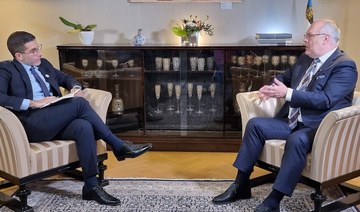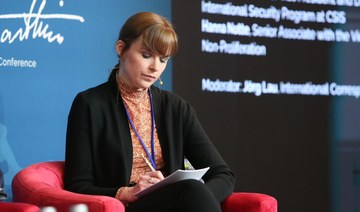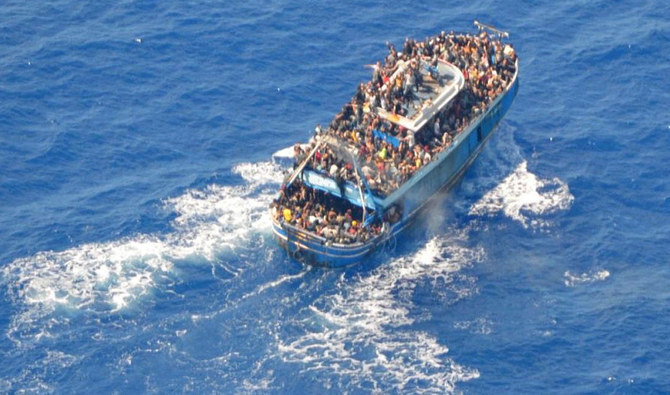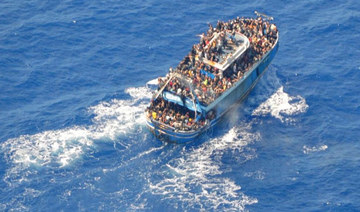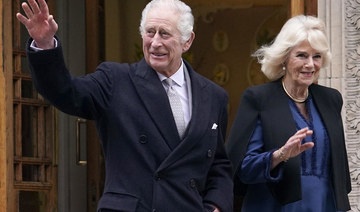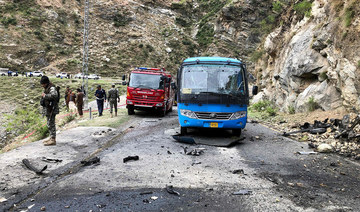TALLINN, Estonia: There is no alternative to Ukraine joining NATO, Alar Karis, the president of Estonia, told Arab News in an exclusive interview at the presidential palace in the capital Tallinn on the margins of the annual Lennart Meri Conference on Friday.
In recent days, 95 Estonian legislators have signed a statement calling for Ukraine’s immediate ascension to NATO at the alliance’s July summit in Vilnius, Lithuania, claiming it was the only option for ensuring world order, peace and security.
Karis said the Estonian government was seeking a “road map” for Ukraine’s acceptance into NATO to strengthen the bloc’s collective security against Russia, which invaded Ukraine in February last year.
“The same with the EU. We need to have these steps, concrete steps, of what one country has to do to become a member,” he said.
However, there is currently little alignment between key NATO member states on the timing or necessity of Ukraine’s inclusion in the bloc, with Hungary, Germany, and even the US voicing concerns over the move.
In September, asked if Ukraine’s request for accelerated membership in NATO is something that Washington was ready to consider, Jake Sullivan, the US national security adviser, said the best way to support Kyiv is “through practical, on-the-ground support” and that “the process in Brussels should be taken up at a different time.”
How do nations on NATO’s eastern fringes react to this attitude of the Biden administration?
“Different countries, of course, have different opinions,” Karis said. “The same also with EU membership. So that means we have to discuss and explain how and why it’s important. It doesn’t happen overnight, but that doesn’t mean that we shouldn’t talk about it. So we should discuss how to reach this goal. It doesn’t mean we have to keep silent also in Vilnius.
“It is important to be a member of an alliance, and the only ally, defense ally, which is now available is NATO. There is no other way actually. But that would require all member states to approve.”
For Karis and other Eastern European leaders, it is a matter of collective defense.
“It’s not only us. It’s not only Estonia — Latvia, Lithuania and now Finland. It affects all of us. It’s not only Europe. There is also a transatlantic dimension,” he said.
“So, as I said, you have to explain why it is important, and go back to history, looking for a future because there is no other alternative. What’s the alternative? If somebody comes up with an alternative, we can discuss. But there is no alternative at the moment.”
Drawing a parallel with the Baltic state’s past, Karis said: “Estonia was in the very same situation at the beginning of the 1990s, or even the end of the 1980s, when we were about to leave the Soviet Union. We had started to talk about NATO already.
“And even when we regained our independence, in the beginning of the 1990s, we still had Soviet forces here in our country. And we started to discuss NATO membership and we managed to get this membership, and now we are already 19 years a NATO member.
“So we have to start the same discussions with Ukraine, although there is a war going on at the moment.”
NATO Article 5
Not everyone views Ukraine’s inclusion in NATO as the best security guarantee. Some argue that aggressively expanding NATO into Russia’s traditional sphere of influence has actually provoked Moscow, forcing it to act out of self-defense.
In a survey of 7,000 people in 14 Arab countries, conducted for Arab News by the UK-based polling agency YouGov, most felt it was NATO and US President Joe Biden that were to blame for the situation in Ukraine.
Other analysts have argued that had Ukraine’s NATO membership been expedited prior to the war, the Russian invasion would likely never have happened, as Moscow would never have dared challenge Article 5 of the NATO charter, which obliges members to lend collective support to any member when attacked.
Estonia has been a member of both the EU and NATO since 2004, placing it under the protection of the wider alliance. With a 183-mile shared border with Russia, Estonia and other frontier states are considered especially vulnerable to acts of aggression or retaliation.
Drone attack mystery
On May 3, a drone was shot down over the Kremlin in Moscow. Many commentators believe the incident constituted a direct attack on President Vladimir Putin, raising fears of a potential Russian retaliation against Ukraine or a NATO member state.
Owing to its NATO membership and the guarantee of collective security, Karis said he was not concerned about the possibility of a retaliatory attack.
“First of all, we don’t know where the source of this attack is. So it’s not clear at all,” he said. “And we have been next to Russia for centuries, so we know what to expect and what not to expect. We are not afraid of anything.
“As I mentioned, we are a member of NATO’s alliance. And I do believe, and we do believe, that Article 5 still is going to work. So we are not afraid of any threat. Of course, we have to be prepared. That’s why we need to increase our defense budget, to have more NATO forces on our ground to train and practice and so forth. So this is how to deter Russia.”

Alar Karis, the president of Estonia, speaking to Arab News Editor-in-Chief Faisal J. Abbas in Tallinn. (AN Photo/Ali Salman)
Cybersecurity strength
Estonia has come under attack on a different front — in cyberspace. Last year, it was subjected to a record number of cyberattacks by pro-Russian hackers. Still, Karis said his country’s cybersecurity defenses were top notch.
“We were first attacked in 2007. And we started to prepare ourselves, to defend ourselves, to build up our cybersecurity defense system. And it’s really good,” he said.
“We are all under constant attack, not only our country but many countries. Nothing really has happened so far but we have to continue preparing and developing our defense system as far as cybersecurity is concerned.
“And the same actually in Ukraine. We have assisted the Ukrainians and they have been defending themselves very well as far as cybersecurity is concerned or cyberattacks are concerned.”
Given Estonia’s position as a leader in the digital transformation of commerce and services, among countries in the region it perhaps offers the most opportunities for hackers to try their luck.
“We have to develop our defense system, and we are doing it constantly,” Karis said. “And not only us but together with other countries. And we even have NATO’s security defense center over here. So there are many ways to be prepared.”
While Karis highlighted Estonia’s cybersecurity prowess, he refused to be drawn into discussing whether the nation’s defense analysts have determined who was behind the Kremlin drone attack.
“There are many conspiracy theories, of course, among Russians themselves as well,” he said. “We do not know and this is not our aim to figure out who has done it, at least from our point of view. But of course, we follow the news of what the result of this kind of investigation is.”
Read More from Interview
International tribunal
In a recent interview with Newsweek, Kaja Kallas, Estonia’s prime minister, launched a scathing attack on Russia’s conduct in Ukraine, accusing Russian forces of exhibiting the same “brutality” as the Soviet troops in eastern and central Europe during the Second World War.
Kallas called for a special international tribunal to try Russian officials in absentia for alleged war crimes and abuses, which she claimed had gained the backing of 30 nations, including Ukraine, Lithuania and the new entrant to NATO, Finland.
“Russia has to be accountable for these crimes and atrocities that they have made,” Karis said. “I have been to Kyiv and the Kyiv suburbs, so I have seen what this aggression has done in Ukraine. So that means they have to be accountable.
“There should be a discussion about what kind of court, what kind of tribunal is going to have any effect on this situation. It’s an ongoing discussion.
“Estonia and some other countries have proposed a special tribunal … the most prominent are neighboring countries, which realize it’s important. And we have a history, again, after the Second World War the Soviet Union didn’t have any tribunal over the atrocities against our nation and other nations of theirs.”
Asked whether the establishment of such a tribunal for Russia but not for Israel concerning its treatment of the Palestinian people constituted a double standard, Karis said the two issues were entirely separate and had to be addressed on their individual merits.
“We’re just discussing now about the war in Ukraine and not different conflicts around the world — other conflicts as well, not only in Israel and Palestine,” he said. “So, it’s a case we want to solve first and then we can continue with other conflicts in other regions in the world.”
Urmas Reinsalu, Estonia’s former foreign minister, broke with the EU’s stance on the issue of Israel and Palestine late last year when he said the Baltic state would no longer vote for UN resolutions condemning Israeli actions in the West Bank and the Gaza Strip.
“It’s the position of a former foreign minister. And now we have a new government,” Karis said. “You can ask our new minister of foreign affairs what’s his opinion or what’s that government’s opinion.”
Sudan refugees
Ukraine is not the only conflict on the international agenda. The violence in Sudan, which began on April 15 between the Sudanese Armed Forces and the paramilitary Rapid Support Forces, has raised the specter of a new influx of displaced people into Europe.
European nations, alongside Saudi Arabia, acted quickly to evacuate foreign citizens from Sudan and have mobilized aid deliveries to help those displaced by the fighting and the collapse of infrastructure.
Although grappling with the arrival of some 50,000 Ukrainians on Estonian soil, Karis did not shy away from the question whether, in principle, Estonia would be welcoming to Sudanese refugees.
“If we discuss the matter and make sure that we are able to take, and how many we are able to take,” he replied.
But would he flat out refuse to take Sudanese refugees?
“No,” he said, adding: “We have limited resources and we already have so many refugees from Ukraine. So, it’s impossible to take another, let’s say, 10,000 or 20,000 migrants from Sudan. But of course, there are other countries who have taken and will take, probably, like Germany and some others.
“Of course there is a burden for these countries who are next door. But I think we start to understand more about what’s happening, what kind of migrants are coming from different countries.”
For the time being, there is a great deal of goodwill and openness among Estonians to assisting refugees from Ukraine. But if the war drags on for several years and burdens on the economy grow, how sustainable is this longer term?
“So far, we have been able to give shelter, give education to Ukrainian children, and give jobs,” Karis said. “But then again, we are not the only ones here, because Finland is next door and they propose that if there are too many and we cannot manage with refugees, they will take them. That’s why you need allies and friends.”
He added: “Of course, we are a small country, with limited resources, also military-wise, but we still can provide ammunition and some other things as well. And our people giving humanitarian aid, these numbers are also very high. So we are trying.
“But of course, it’s not only Estonia, but also the US has limited resources if this war lasts dozens of years. So, we have to make sure that this war is going to be over as soon as possible.”
Alar Karis: Biologist turned president
For an apolitical academic whose background is in molecular genetics, Alar Karis created a sensation when he replaced the incumbent president of Estonia in the second round of voting on Aug. 31, 2021, with almost unanimous support in parliament.
Since then, Karis has sought to strengthen Estonia’s relations with its EU, NATO and OECD partners as well as the wider world, including the Gulf countries, while underscoring the need for a rules-based world order and respect for the principles of international law. To this end, he has repeatedly drawn attention to Estonia’s achievements in education, innovation and digital transformation.
For instance, visiting the Estonia pavilion at the Dubai Expo in 2020 in March last year, Karis mentioned that Estonia had the highest number of unicorns per capita in Europe, had a lot to offer in education technology, and had made maximum use of e-services in the public sector and businesses to build a digital society.
At home, Karis has expressed a desire to talk to the different people and communities, including ethnic Russians, who make up Estonia’s population of 1.2 million. The war in Estonia’s neighborhood has, however, obliged Karis to be a vocal defender of the government’s staunchly pro-Ukraine foreign policy.
He has described the Russian invasion as not only an attack on a neighboring country but a war on transatlantic values and democracy itself.
Before becoming president, Karis served as the rector of both the Estonian University of Life Sciences and the University of Tartu, led the work of Universities Estonia a number of times, founded the University of Tartu-spawned Visgenyx, and worked at universities in Germany, Britain and the Netherlands. Born on March 28, 1958, in Tartu, Karis has been married to Sirje Karis since 1977, with whom he has three children and five grandchildren.




